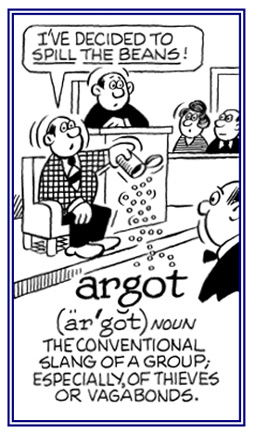Spanish Word of the Day
| April 22nd, 2014 at 3:01:59 AM permalink | |
| Pacomartin Member since: Oct 24, 2012 Threads: 1068 Posts: 12569 | 
Despite the definition above, "argot" (silent t) is traditionally associated with criminal groups particularly con-men and pickpockets. They confuse their marks by speaking their own special language. Shakespeare uses the word "argot" in Hamlet in the gravedigger's scene. The gravedigger is trying to sound like a lawyer , but every time he means to say the Latin word ergo he says "argo" instead. The character is unintentionally comparing the argot of thieves with the jargon of lawyers. Lunfardo is an argot originated and developed in the late 19th and early 20th centuries in the lower classes in Buenos Aires . Largely because of tango the word has broadened to refer to the dialect of the region. "Taita" is a Lunfardo word. |
| April 25th, 2014 at 5:19:25 PM permalink | |
| Wizard Administrator Member since: Oct 23, 2012 Threads: 239 Posts: 6095 | Fecha: 25-4-14 Palabra: Flamante Today's SWD means brand new. The assignment for the advanced readers is to confirm or deny a common etymology with flamear (to flame). Ejemplo time. No me gusta ensuciar los zapatos flamantes. = I don't like to get my new shoes dirty. Remember: Body parts and clothing are never possessive in Spanish. Knowledge is Good -- Emil Faber |
| April 25th, 2014 at 8:04:59 PM permalink | |
| Pacomartin Member since: Oct 24, 2012 Threads: 1068 Posts: 12569 | The word "flamante" is closely related to the word "flamear". I think the word looks funny in describing shoes (unless they are Manola Blahniks)  I think it means "brand new" like a supernova (or a sports car or something equivalent). |
| April 26th, 2014 at 10:10:43 AM permalink | |
| Nareed Member since: Oct 24, 2012 Threads: 346 Posts: 12545 | We have several interesting and problematic words. Expect some help after May8th when I'm back home. For now, I think the best term for "amparo" is "succor." And come to think of it, that word might be related to the Spanish "socorro," which incidentally is also a female name. Flamante requires a more extensive explanation. But it's not used to denote "new" as much as a kind of new, like "sparkling new," or "shining new" It is related to "flama" Donald Trump is a one-term LOSER |
| April 26th, 2014 at 12:59:44 PM permalink | |
| Pacomartin Member since: Oct 24, 2012 Threads: 1068 Posts: 12569 |
The dictionary says "¡socorro!" means "help!" I am guessing that it is not a common word.  The word "succor" (or succour in BrE) has been in English for at least 800 years, but it is very infrequently used. The more recent word, "assist" or the older word "help" are much preferred. If you see the word, it is usually in the context of religion (or in Louisiana where Cajun is spoken).  |
| April 26th, 2014 at 3:04:27 PM permalink | |
| Wizard Administrator Member since: Oct 23, 2012 Threads: 239 Posts: 6095 | I knew socorro meant help. I'd hate to have that name. When people called my name I wouldn't be sure if they just wanted my attention or if there were some emergency. Fecha: 26-4-14 Palabra: Azorar Today's SWD means to embarrass. The assignment for the advanced readers is to compare and contrast azorar y avergonzar. Ejemplo time. Cuando equivocado estoy azorado. = When I'm wrong I am embarrassed. Knowledge is Good -- Emil Faber |
| April 26th, 2014 at 3:30:52 PM permalink | |
| Pacomartin Member since: Oct 24, 2012 Threads: 1068 Posts: 12569 | The word "azorar" seems to be better translated as "startle". It comes "azor" which is "goosehawk" in English.  |
| April 26th, 2014 at 9:25:07 PM permalink | |
| Wizard Administrator Member since: Oct 23, 2012 Threads: 239 Posts: 6095 | Fecha: 27-4-14 Palabra: ajetrearse Today's SWD means to fidget. Ejemplo time. Gilligan se ajetrea cuando esta azoraba. = Gilligan fidgets when he is embarrassed. Knowledge is Good -- Emil Faber |
| April 27th, 2014 at 3:40:39 AM permalink | |
| Pacomartin Member since: Oct 24, 2012 Threads: 1068 Posts: 12569 |  I associate fidgeting as something you do with your fingers, or if you bounce your leg up and down. The Spanish word implies more movement of your body, more like "bustling" |
| April 28th, 2014 at 7:53:29 AM permalink | |
| Wizard Administrator Member since: Oct 23, 2012 Threads: 239 Posts: 6095 | Fecha: 28-4-14 Palabra: Buey Today's SWD means ox. The assignment for the advanced readers is to find and explain the etymology and origins of the word. I wonder if maybe the word comes originates from the sound an ox makes. Or maybe the "good" root as in bueno, perhaps because it is a good thing to have an ox to pull around heavy objects. Ejemplo time. Pablo Bunyan tiene un buey azul. = Paul Bunyan has a blue ox.  Knowledge is Good -- Emil Faber |

